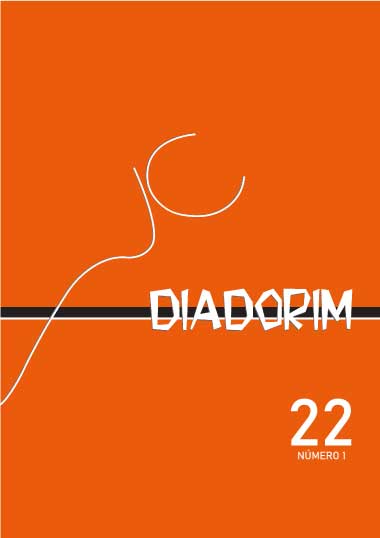Interlíngua
DOI:
https://doi.org/10.35520/diadorim.2020.v22n1a30523Keywords:
aprendizagem de segunda língua, interlíngua, fossilizaçãoAbstract
O artigo demonstra que os fatores pertinentes da aprendizagem da segunda língua podem ser encontrados graças a um exame comparado de três sistemas linguísticos produtivos, quais sejam: (1) a língua materna do aluno, (2) a competência do aluno na segunda língua, sua língua intermediária (Interlíngua), e (3) o sistema da língua-alvo. Finalmente, descrevem-se os processos que são responsáveis pela diferença entre a língua intermediária do aluno e sua competência desejada na língua-alvo.
References
BRIÈRE, Eugène J. A Psycholinguist Study of Phonological Interference. Haia: Mouton, 1968.
CHOMSKY, Noam. Aspects of the Theory of Syntax. Cambridge, Massachusetts: M.I.T. Press, 1965.
_____. “Linguistic Theory”. In: Northeast Conference on the Teaching of Foreign Languages, p. 43-49, 1966.
_____. “Linguistics and Philosophy”. In: HOOK, Sidney (org.). Language and Philosophy. Nova York: New York University Press, 1969. p. 51-94.
CORDER, Stephen Pit. “The Significance of Learner’s Errors”. In: IRAL, v. 5, 1967. p. 161-170.
COULTER, Kenneth. Linguistic Error: Analysis of the Spoken English of Two Native Russians. Dissertação de mestrado. University of Washington, 1968.
CROTHERS, Edward; SUPPES, Patrick. Experiments in Second-Language Learning. Nova York: Academic Press, 1967.
FODOR, Jerry A. Psychological Explanation: An Introduction to the Philosophy of Psychology. Nova York: Random House, 1968.
HAGGARD, Hark P. “Models and Data in Speech Perception”. In: WATHEN-DUNN, Weiant (org.). Models for the Perception of Speech and Visual Form. Cambridge, Massachusetts: M.I.T. Press, 1967. p. 331-339
HYMES, Dell. “On Communicative Competence”. In: PRIDE, J.B.; HOLMES, J. (orgs.). Sociolinguistics. Selected Readings. Harmondsworth: Penguin, 1972. p. 269-293
JAIN, Mahavir. “Error Analysis of an Indian English Corpus”. Artigo inédito. University of Edinburgh, 1969. [À época, no prelo.]
JAKOBOVITS, Leon A. “Second Language Learning and Transfer Theory: a Theoretical Assessment”. In: Language Learning, v. 19, junho de 1969. p. 55-86.
_____. Foreign Language Learning: A Psycholinguistic Analysis of the Issues. Berkshire: Newbury House, 1970.
KLINE, Helen. “Research in the Psychology of Second-Language Learning”. Artigo inédito. University of Minnesota, 1970.
LABOV, William. “Contraction, Deletion, and Inherent Variability of the English Copula”. In: Language, v. 45.4, 1969. p. 715-762.
LAKOFF, George. “On Generative Semantics”. In: STEINBERG, Danny; JAKOBOVITS, Leon (orgs.). Semantics: An Interdisciplinary Reader in Philosophy, Linguistics, Anthropology and Psychology. Cambridge: Cambridge University Press, 1970. [À época, no prelo.]
LAWLER, John; SELINKER, Larry. “On Paradoxes, Rules, and Research in Second-Language Learning”. In: Language Learning, v. 21, 1971. p. 27-43. [À época, no prelo.]
LENNEBERG, Eric H. Biological Foundations of Language. Nova Jersey: John Wiley and Sons Inc., 1967.
NEMSER, William: “Approximative Systems of Foreign Language Learners”. In: IRAL, v. 9, 1971. p. 115-123.
REIBEL, D.A. “Language Learning Strategies for the Adult”. Comunicação lida no Second International Congress of Applied Linguistics. Cambridge University, setembro de 1969.
RICHARDS, Jack C. “A Non-Contrastive Approach to Error Analysis”. Artigo entregue na TESOL Convention. São Francisco, março de 1970.
SELINKER, Larry. “Language Transfer”. In: General Linguistics, v. 9, 1969, p. 67-92.
WATKIN, K.L. “Fossilization and its Implications Regarding the Interlanguage Hypothesis”. Artigo inédito. University of Washington, 1970.
WEINREICH, Uriel. Languages in Contact. Nova York: The Linguistic Circle of New York, 1953.
Downloads
Published
Issue
Section
License
Copyright transfer -- Authorization to publication
If the submitted article is approved for publication, it is already agreed that the author authorizes UFRJ to reproduce it and publish it in Diadorim: revista de estudos linguísticos e literários, the terms "reproduction" and "publication" being understood as defined respectively by items VI and I of article 5 of Law 9610/98. The article can be accessed both by the World Wide Web (WWW) and by the printed version, with free consultation and reproduction of a copy of the article for the own use of those who consult. This authorization of publication is not limited in time, and UFRJ is responsible for maintaining the identification of the author of the article.

The journal Diadorim: revista de estudos linguísticos e literários is licensed under a Creative Commons Attribuition-NonCommercial 4.0 International (CC BY-NC 4.0).

